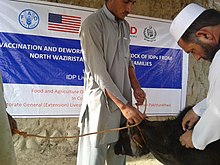
Back تطعيم الحيوان Arabic Eläinten rokottaminen Finnish Vaksinasi hewan ID Hayvanlarda aşılanma Turkish

Animal vaccination is the immunisation of a domestic, livestock or wild animal.[1] The practice is connected to veterinary medicine.[1] The first animal vaccine invented was for chicken cholera in 1879 by Louis Pasteur.[2] The production of such vaccines encounter issues in relation to the economic difficulties of individuals, the government and companies.[3] Regulation of animal vaccinations is less compared to the regulations of human vaccinations.[3][4] Vaccines are categorised into conventional and next generation vaccines.[5][6] Animal vaccines have been found to be the most cost effective and sustainable methods of controlling infectious veterinary diseases.[6] In 2017, the veterinary vaccine industry was valued at US$7 billion and it is predicted to reach US$9 billion in 2024.[7]

- ^ a b "Vaccination for animal health: an overview". NOAH (National Office of Animal Health). Retrieved 2020-05-20.
- ^ "The Antibody Initiative -- Veterinary Vaccines and Serums". National Museum of American History. Retrieved 2020-05-20.
- ^ a b Donadeu M, Nwankpa N, Abela-Ridder B, Dungu B (February 2019). Rupprecht CE (ed.). "Strategies to increase adoption of animal vaccines by smallholder farmers with focus on neglected diseases and marginalized populations". PLOS Neglected Tropical Diseases. 13 (2): e0006989. doi:10.1371/journal.pntd.0006989. PMC 6366725. PMID 30730883.
- ^ "Pet vaccination - Health". CHOICE. 2014-06-11. Retrieved 2020-05-21.
- ^ Thomas S (2016). Vaccine design: methods and protocols. Vaccines for veterinary diseases. Vol. 2. Humana Press. ISBN 978-1493933884.
- ^ a b Cite error: The named reference
:12was invoked but never defined (see the help page). - ^ "Home". HealthforAnimals. Retrieved 2020-05-28.
© MMXXIII Rich X Search. We shall prevail. All rights reserved. Rich X Search